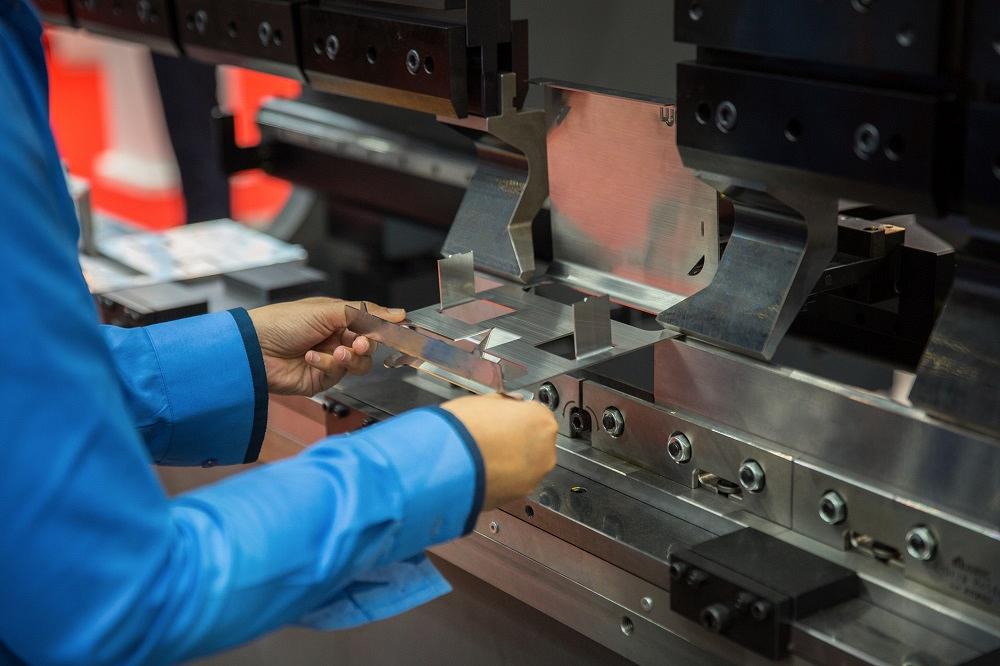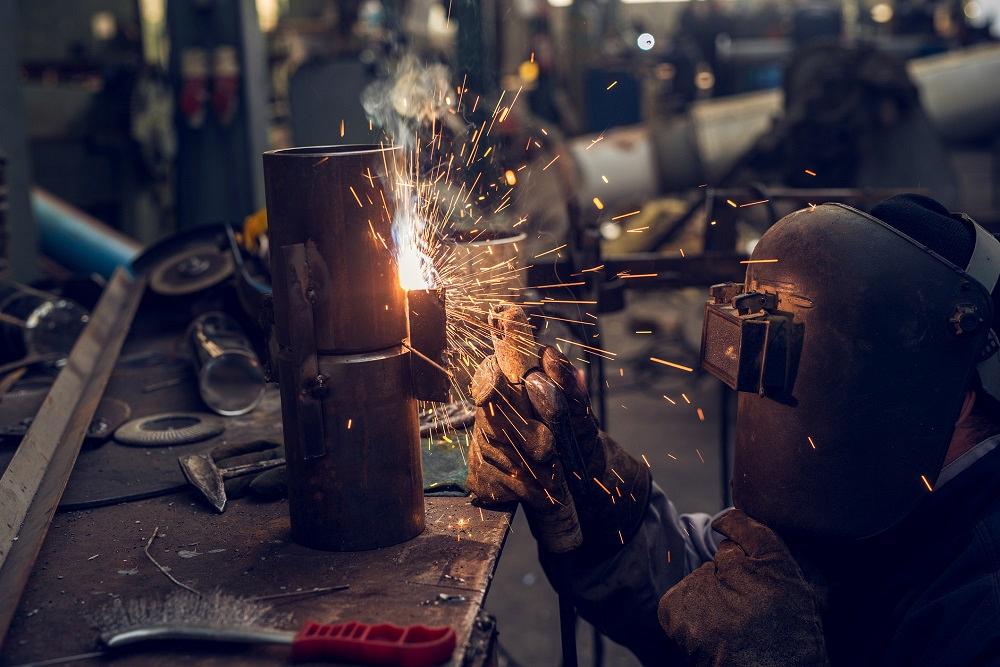- FMA
- The Fabricator
- FABTECH
- Canadian Metalworking
Categories
- Additive Manufacturing
- Aluminum Welding
- Arc Welding
- Assembly and Joining
- Automation and Robotics
- Bending and Forming
- Consumables
- Cutting and Weld Prep
- Electric Vehicles
- En Español
- Finishing
- Hydroforming
- Laser Cutting
- Laser Welding
- Machining
- Manufacturing Software
- Materials Handling
- Metals/Materials
- Oxyfuel Cutting
- Plasma Cutting
- Power Tools
- Punching and Other Holemaking
- Roll Forming
- Safety
- Sawing
- Shearing
- Shop Management
- Testing and Measuring
- Tube and Pipe Fabrication
- Tube and Pipe Production
- Waterjet Cutting
Industry Directory
Webcasts
Podcasts
FAB 40
Advertise
Subscribe
Account Login
Search
A metal fabrication shop’s success and the employer-worker connection
Respect, consideration, and commitment matter
- By Vicki Bell
- March 13, 2019
This will be my last post on thefabricator.com, and I honestly can’t think of a better topic to end what’s been the unbelievable journey I never anticipated when I began working for the Fabricators & Manufacturers Association in 1998. But that’s another story.
This post is about a shop’s (any organization’s, for that matter) culture, and how important it is to click with that dynamic, if you want to become a team player and work toward the success of the shop and its workers. I have seen employees who “fit” and those who didn’t. I’m sure you have also. Maybe you have held jobs in places where you did not, could not, and didn’t want to fit. Not all shops and cultures are healthy. (Far too many aren’t, if you agree with Jason T., quoted later in this post.) If it doesn’t feel right, leave it behind when you can. Toxic jobs can wreck your health and relationships. Life’s too short for that nonsense. I know, because I have a lot of years behind me, have left a toxic job, and am retiring from a fulfilling career with a decent, worthwhile organization that serves the metal fabrication industry—the backbone of America.
This topic was inspired by a recent post by Nick Martin of BarnesMetalcrafters, Wilson, N.C., which was featured in this month’s issue of “Fabricating Update.” Nick said, “Like most shops, ours has a ‘culture.’ The dynamic of how things work often is unspoken and can’t be explained. A lot goes on to make products successfully, so being committed to that culture or process is what makes small shops like ours succeed. Having or finding the right people to make this happen is one of the biggest keys to our success.”
At the end of this item in the newsletter, we asked readers to share their thoughts about Nick’s theory.
One Bad Apple
Robert M. said, “I work in a 9-person laser cutting services shop. We had one employee who was recently let go. His work ethic was awful and his willingness to help others was nonexistent. The boss finally let him go, but perhaps a few years too late. It was miserable working with him. He had no desire to improve performance or get a better knowledge of his machine controller. Even very simple fixes an operator should perform he demanded the part be reprogrammed.
“Simple courtesy, like moving parts from his laser to deburr, he was so reluctant to do. This would almost every time slow delivery to the customer. We were stuck with the guy, because new hires were nowhere to be found. Online job ads went months without any response. And then a shop closed due to owner medical issues, and we found his replacement. The two operators could not be more different. The new operator took home the manual the first day to try to learn more; the old operator was unwilling to learn.
“I was joking to my coworker that with the new operator, going home was peaceful and headache-free. He has only been there four days, and our blood pressure level has certainly dropped!”
Others echoed Robert’s sentiments, but not everyone put all the blame for the disconnect on the worker who doesn’t make the cut.
The Employer’s Role
Jason T. shared some important insight about what he’s seeing in terms of the employer - employee relationship.
“Question: What is Nick doing for the advancement and improvement of his staff, or is it lip service and a one-way street? You work harder for me blah, blah, blah, and you will enjoy your job better—really.” (Jason, I encourage you to read more of Nick’s posts. This operation is very much focused on its employees’ well-being and professional advancement. The shop is a family.)
Jason continued, “Wages are at an all-time low, (uneducated) managers feel that they are in authority just because they employ you without the credentials to back up their positions. They treat staff like robots and undermine them at any opportunity.
“Quote from John Saunders NYCCNC: ‘Staff are like a machine or asset. You don't employ them expecting to fill every hour of every day for them as a prerequisite; you get a machine as an investment.The machine then proves its worth by increasing your capacity.’
“You don't buy an electric drill as a tradesperson because you have 80 hours a week work for it; you would buy one as you suspect you will need it, i.e., an investment.
“Employers are great at spouting how despondent staff are at work, but when do they have a meaningful meeting with their staff about what changes can be made to improve their working conditions? If you don't invest in repairs or pay attention to your machines, they will eventually respond in the same manner as your staff.
“The skills shortage is yet another consequence of poor management. You have to employ the right people for the right job. This foolish ambition of companies over the last 20 years to only employ graduates has led to a lack of available craftsmen and women.
“The salary is yet another turn-off, who wants to work for the same wages as a public servant janitor when they are a skilled craftsperson.
“Face-to-face recruitment—when companies show such little regard for whom they employ by using agencies or recruitment consultants, then they are basically telling you that they are going to be standoffish with you when they accept your application. They are not interested in you and don't care who you are.
“The oil giants introduced coffee bars into their offices and provided flexible working hours and child care in-house. They announced that their productivity increased, the staff were happier, and most exceeded their expected working hours. They enjoyed going to work.
“The unfortunate situation for modern employers is that their staff are tech-savvy and more informed than at any other time in history. So why is it the Victorian working conditions are starting to slip back in? Bosses want higher and higher salaries, and yet the staffs’ wages have remained stagnant in real terms over the last 20 years; staff numbers have been cut, and yet employers still want the same amount of productivity and constantly look for ways of cutting costs and maximizing profits.
“During the late 90s and early 2000s, businesses made the brave move of reducing the last costing which was affecting their bottom line—manpower. The decline of job satisfaction, the decline in the number of skilled people prepared to work for peanuts, and the overall decline of productivity are all directly linked.
“If a CEO of a company happens across my CV and invites me to an interview my first question is, ‘What’s in it for me?’ It’s great you have a successful business and a holiday home in the Hamptons, but why would i want to take insults from someone who is no better person than me, work until it makes me ill, and still barely afford to meet my bills and health insurance?
“We need more Cadbury's type bosses, the chocolate manufacturer who built homes and towns for his employees, taking workers out of the Victorian slum existence.
“People are your greatest asset. Unfortunately, companies no longer wish to run a successful business; they merely wish to run a maximum-profit one. The cost is your staff. Please don't whine about staff retention and on the other hand don't give a crap about them. You are merely wasting oxygen. The first employer to hold up their hand and say, ‘Do you know what? I'm going to put my staff first?’ will be hailed by workers and hated by other bosses; they will get to pick the best employees, as they will have to turn so many applicants away.
“In the machining world Boeing is considered one of the best to work for. It has the best staff retention, the best working conditions, and is not afraid to invest in people and equipment. All machinists dream of working for the company.
“I would work for Boeing. I wouldn't even ask what the salary was going to be at the interview, because I would just know I would be well-treated.
Jason’s Challenge
“These are my thoughts. I will set a challenge: let’s see who will pick up the gauntlet, man up, and face the argument that employees are unhappy and disconnected from the workplace. Then we can have a real discussion about the future for manufacturing and productivity. They will simply pass over my comments as being those from someone who is simply disgruntled in the workplace. Isn't that the point?”
Jason’s points are valid, no matter what size company is being discussed. It’s a two-way street, my friends. Employers much care about employees’ welfare, and employees must be committed to the company’s success. If one of these conditions is not met, the result is a toxic, nonproductive workplace that is detrimental for all concerned.
As my career in the metal fabricating industry comes to an end, I wish you all good health, wonderful relationships at home and work, and good fortune. I could not have landed in a better industry. Metal fabricating is the best. Oh, and keep sharing your thoughts about the industry with those of us in associations that support you. You and your thoughts matter.
subscribe now

The Fabricator is North America's leading magazine for the metal forming and fabricating industry. The magazine delivers the news, technical articles, and case histories that enable fabricators to do their jobs more efficiently. The Fabricator has served the industry since 1970.
start your free subscriptionAbout the Author

Vicki Bell
2135 Point Blvd
Elgin, IL 60123
815-227-8209
- Stay connected from anywhere

Easily access valuable industry resources now with full access to the digital edition of The Fabricator.

Easily access valuable industry resources now with full access to the digital edition of The Welder.

Easily access valuable industry resources now with full access to the digital edition of The Tube and Pipe Journal.
- Podcasting
- Podcast:
- The Fabricator Podcast
- Published:
- 04/16/2024
- Running Time:
- 63:29
In this episode of The Fabricator Podcast, Caleb Chamberlain, co-founder and CEO of OSH Cut, discusses his company’s...
- Trending Articles
Capturing, recording equipment inspection data for FMEA

Tips for creating sheet metal tubes with perforations

Are two heads better than one in fiber laser cutting?

Supporting the metal fabricating industry through FMA

Hypertherm Associates implements Rapyuta Robotics AMRs in warehouse

- Industry Events
16th Annual Safety Conference
- April 30 - May 1, 2024
- Elgin,
Pipe and Tube Conference
- May 21 - 22, 2024
- Omaha, NE
World-Class Roll Forming Workshop
- June 5 - 6, 2024
- Louisville, KY
Advanced Laser Application Workshop
- June 25 - 27, 2024
- Novi, MI





























